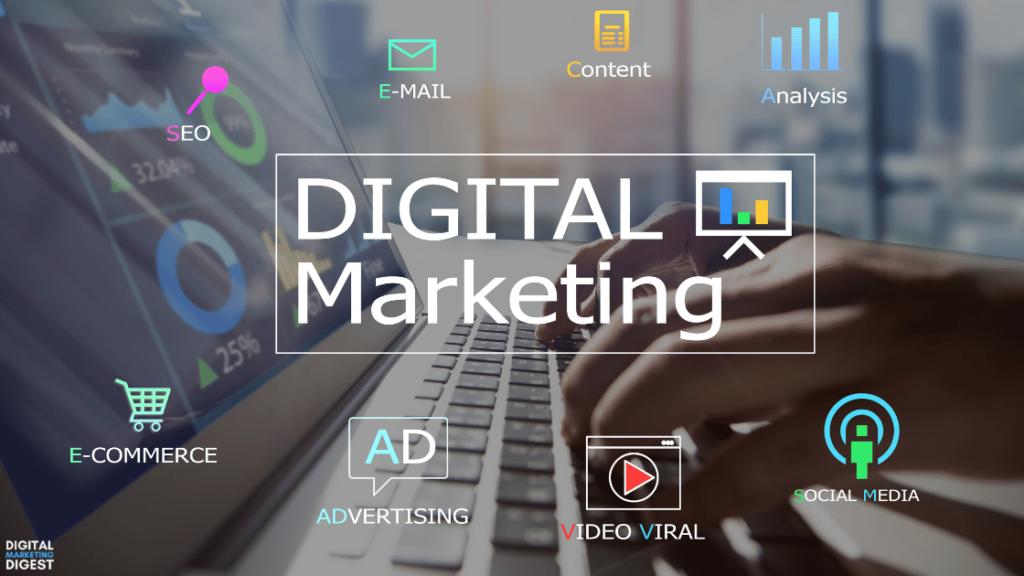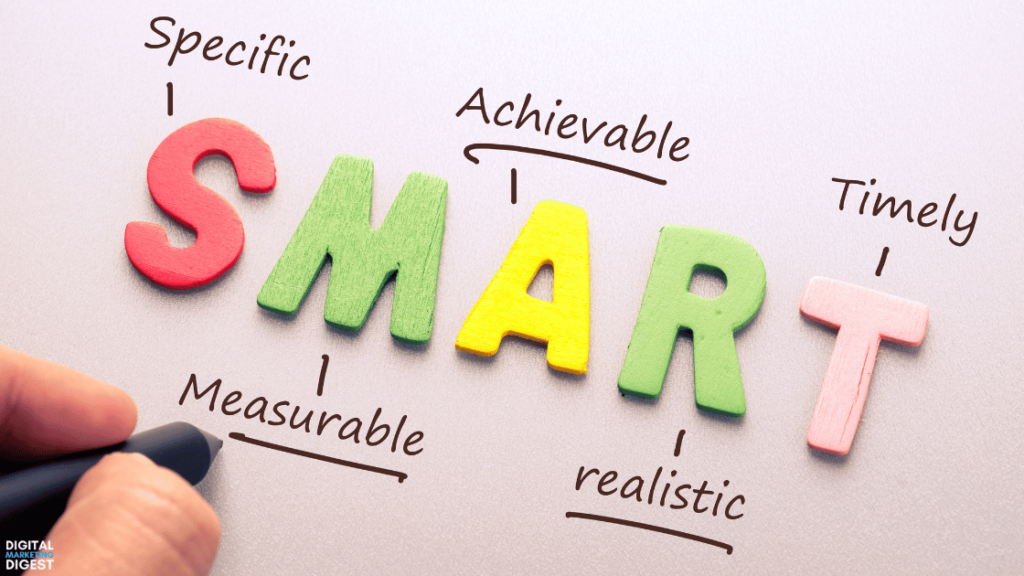

As a small business owner, you know how challenging it can be to stand out in today’s crowded online marketplace. With so many competitors vying for the attention of potential customers, it’s more important than ever to have a solid digital marketing strategy in place.
Digital marketing is the process of promoting your business online through a variety of channels, including social media, email marketing, search engine optimization (SEO), and pay-per-click (PPC) advertising. By leveraging these tools and techniques, you can reach a wider audience, build brand awareness, and drive more traffic to your website.
In this ultimate guide to digital marketing for small businesses, we’ll cover everything you need to know to get started with your own digital marketing campaign, including:
- The benefits of digital marketing for small businesses
- How to set measurable goals for your digital marketing campaign
- The different types of digital marketing channels and how to use them effectively
- Tips for creating compelling content that engages your audience
- How to measure the success of your digital marketing efforts
- Common digital marketing mistakes to avoid
- And much more!
So let’s dive in and explore the world of digital marketing together.
Importance of Digital Marketing for Small Businesses
In today’s digital age, having a strong online presence is crucial for small businesses to succeed. Traditional marketing methods can be expensive and may not reach a wide enough audience to justify the cost. This is where digital marketing comes in. Here are some key reasons why digital marketing is essential for small businesses:
Reach a Wider Audience
Digital marketing channels like social media, email marketing, and pay-per-click (PPC) advertising can help you connect with potential customers all around the world. In fact, 4.76 billion people use social media worldwide, making it a valuable platform to reach a large audience. By creating compelling content and using targeting options, you can reach the right people and increase your chances of converting them into customers.
Build Brand Awareness
Consistent messaging and engaging content can help build a strong brand identity and increase recognition. This is important for small businesses looking to establish themselves in a competitive market. According to a study by Nielsen, 59% of consumers prefer to buy products from brands they recognize. By using digital marketing tactics like social media and content marketing, you can increase your brand visibility and earn the trust of potential customers.
Cost Effective
Many digital marketing channels are more affordable than traditional marketing methods, making them ideal for small businesses with limited budgets. For example, email marketing has an average ROI of 4200%, making it one of the most cost-effective marketing channels available. Similarly, PPC advertising allows you to set a budget and only pay when someone clicks on your ad, ensuring you get the most bang for your buck.
Increased Traffic
By optimizing your website for search engines and promoting your content online, you can drive more traffic to your site and increase your chances of generating leads and sales. In fact, 68% of online experiences begin with a search engine, highlighting the importance of having a strong presence on search engines like Google. By using tactics like search engine optimization (SEO) and content marketing, you can improve your website’s visibility and attract more qualified leads to your business.
Measurable Results
One of the biggest advantages of digital marketing is that it provides measurable results. With tools like Google Analytics, you can track the success of your campaigns and make data-driven decisions to improve your results over time. This allows you to see what’s working and what’s not, and adjust your tactics accordingly. For example, if you notice that a particular ad or social media post is generating a lot of engagement, you can replicate that success in future campaigns.
Setting Goals for Your Digital Marketing Campaign


Before you dive into the world of digital marketing, it’s important to set clear and measurable goals for your campaign. Here are some tips to help you set SMART goals for your digital marketing campaign:
Identify Your Target Audience
One of the first steps in setting goals for your digital marketing campaign is to identify your target audience. Who do you want to reach with your digital marketing efforts? Be specific about their demographics, interests, and behaviors.
For example, if you own a small pet supply store, your target audience might be pet owners who are interested in natural and organic products for their pets. By identifying your target audience, you can tailor your digital marketing efforts to meet their needs and preferences.
Define Your Objectives
The next step is to define your objectives. What do you want to achieve with your digital marketing campaign? Examples could include increasing website traffic, generating leads, boosting sales, or increasing social media engagement.
It’s essential to have a clear understanding of what you want to achieve with your campaign so that you can create relevant goals that align with your overall business objectives.
Set SMART Goals
Once you’ve identified your target audience and defined your objectives, it’s time to set SMART goals. SMART goals are specific, measurable, achievable, relevant, and time-bound. This approach ensures that your goals are realistic and achievable, and that progress towards achieving them can be tracked over time.
For example, a SMART goal for a small business looking to increase website traffic might be: “Increase website traffic by 25% within the next 6 months by optimizing website content, improving website design, and increasing social media promotion.”
Create a Plan
Finally, once you have your goals in place, it’s essential to create a detailed plan outlining the tactics and strategies you’ll use to achieve them. Your plan should include specific actions, timelines, and metrics to measure progress toward your goals.
Industry statistics show that setting clear goals and creating a detailed plan can significantly impact the success of your digital marketing campaign. According to a survey by Smart Insights, businesses that set specific digital marketing goals are 376% more likely to achieve them than those without specific goals.
In addition, a study by HubSpot found that businesses with a documented digital marketing strategy are 538% more likely to see a positive return on investment compared to those without a strategy.
Choosing the Right Digital Marketing Channels


There are many different digital marketing channels available, each with its own unique benefits and challenges. Here’s an overview of some of the most popular channels and how to use them effectively:
Social Media
Social media platforms have become a vital tool for small businesses looking to connect with their audience. According to Statista, the number of social media users worldwide is projected to reach almost 4.4 billion by 2025. To use social media effectively, businesses need to create a consistent brand voice and post engaging content regularly. It’s also important to interact with your followers and respond to comments and messages promptly. Additionally, using paid social media advertising can help you reach a larger audience and generate leads.
Email Marketing
Email marketing has the highest ROI of any digital marketing channel, according to Campaign Monitor. However, it’s important to segment your email list based on interests and behaviors to send personalized messages that will resonate with your audience. Additionally, using email automation tools can help you save time and improve your email marketing efforts.
Search Engine Optimization (SEO)
SEO is the practice of optimizing your website to rank higher in search engine results pages (SERPs). According to Search Engine Journal, 93% of online experiences begin with a search engine, making SEO a crucial aspect of any digital marketing strategy. To improve your website’s SEO, focus on creating high-quality content that provides value to your audience and includes relevant keywords. Additionally, optimizing your website’s technical aspects, such as page load speed and mobile-friendliness, can also help improve your search engine rankings.
Pay-Per-Click (PPC) Advertising
PPC advertising allows businesses to bid on keywords and display ads to targeted audiences on search engines and social media platforms. According to Wordstream, businesses make an average of $2 in revenue for every $1 spent on Google Ads. To use PPC advertising effectively, make sure to use compelling ad copy and landing pages that align with your audience’s interests and needs. Additionally, continually analyzing and optimizing your PPC campaigns can help improve their effectiveness and ROI.
Content Marketing
Content marketing involves creating valuable and informative content, such as blog posts, infographics, and videos, to attract and engage your target audience. According to HubSpot, companies that blog receive 97% more links to their website than those that don’t. To use content marketing effectively, create a content strategy that aligns with your business goals and appeals to your audience’s interests and pain points. Additionally, promoting your content through social media and email marketing can help increase its reach and engagement.
Creating Compelling Content for Your Digital Marketing Campaign
Content is king in the world of digital marketing. Here are some tips for creating content that engages your audience and drives results:
Know Your Audience
Understanding your target audience is key to creating content that resonates with them. By conducting audience research, you can gather information about their interests, preferences, behaviors, and pain points. According to a survey by HubSpot, 64% of marketers use audience research to improve the relevance of their content.
Use Storytelling
Storytelling is a powerful technique for creating a connection with your audience and making your content more engaging. By weaving a narrative into your content, you can capture your audience’s attention and evoke emotions. A survey by Content Marketing Institute found that 68% of B2B marketers use storytelling in their content marketing efforts.
Use Visuals
Visuals like images, videos, and infographics can make your content more appealing and easier to understand. According to a study by HubSpot, adding visuals to your content can increase people’s willingness to read it by 80%.
Be Authentic
Authenticity is important in building trust with your audience and establishing your brand as a thought leader. By using a genuine and relatable tone in your content, you can humanize your brand and differentiate yourself from competitors. A survey by Stackla found that 90% of consumers say authenticity is important when deciding which brands to support.
Provide Value
Creating content that provides value to your audience is crucial for building long-term relationships and driving results. By answering their questions, solving their problems, or providing helpful information, you can establish yourself as a trusted source of information in your industry. According to a survey by Demand Gen Report, 96% of B2B buyers want content with more input from industry thought leaders.
Measuring the Success of Your Digital Marketing Campaign


To ensure the success of your digital marketing campaign, it’s important to track and measure your results. Here are some metrics to keep an eye on:
Website Traffic
By tracking your website traffic, you can see which channels are driving the most visitors to your site and adjust your strategy accordingly. Google Analytics is a popular tool for tracking website traffic, and it allows you to see metrics such as total visitors, unique visitors, pageviews, bounce rate, and more.
Conversion Rate
Your website’s conversion rate measures the percentage of visitors who take a desired action on your site, such as making a purchase or filling out a form. A high conversion rate indicates that your website and marketing strategy are effectively encouraging visitors to take action. Conversion rates vary by industry and can range from 1% to 10% or more.
Engagement
Social media engagement metrics such as likes, comments, shares, and followers are important indicators of how well your content is resonating with your audience. By monitoring these metrics, you can identify which types of content are most popular with your audience and adjust your strategy accordingly.
ROI
Calculating your return on investment (ROI) for each digital marketing channel allows you to see which channels are generating the most revenue for your business. To calculate ROI, subtract the cost of the campaign from the revenue generated by the campaign and divide the result by the cost of the campaign. A positive ROI indicates that the campaign is generating more revenue than it is costing, while a negative ROI indicates that the campaign is not generating enough revenue to justify the cost.
Common Digital Marketing Mistakes to Avoid
Digital marketing can be complex and challenging, and there are many common mistakes that small businesses often make. Here are some mistakes to avoid:
Focusing On Quantity Over Quality
Instead of creating a large volume of low-quality content, focus on creating high-quality content that provides value to your audience.
Quality content is a key factor in engaging customers and improving search engine rankings. According to HubSpot, marketers who prioritize blogging efforts are 13x more likely to see a positive ROI.
Additionally, research from Content Marketing Institute found that 77% of B2B marketers believe that their content marketing strategy is successful if it provides their audience with educational content that helps them make informed decisions.
Neglecting Mobile Optimization
With more and more users accessing the internet on mobile devices, it’s essential to optimize your website and content for mobile.
Mobile optimization is crucial for any business that wants to reach its target audience. According to Statista, mobile devices accounted for 55.73% of all website traffic worldwide in 2021.
Additionally, Google has indicated that mobile-friendly websites will rank higher in search results than those that aren’t optimized for mobile devices.
Ignoring Seo Best Practices
By neglecting SEO best practices, you’re missing out on a valuable opportunity to drive organic traffic to your site.
SEO is critical to the success of any digital marketing campaign. Research from BrightEdge shows that organic search is responsible for 53% of all website traffic, and SEO has a 14.6% conversion rate, compared to a 1.7% average conversion rate for traditional outbound methods.
Furthermore, Google’s algorithms are becoming increasingly sophisticated, making it more important than ever to stay up-to-date with the latest SEO best practices.
Neglecting Social Media Engagement
Simply posting content on social media isn’t enough – you need to actively engage with your followers and respond to their comments and messages.
Social media engagement is key to building relationships with your audience and increasing brand awareness. Research from Sprout Social found that 90% of consumers are more likely to recommend a brand to others after a positive interaction on social media.
Additionally, Hootsuite reported that companies that engage with their customers on social media see an increase in customer loyalty by 71%.
Not Tracking Your Results
Without tracking and measuring your results, you won’t know which channels and tactics are driving the most value for your business.
Tracking and measuring your digital marketing efforts is essential to understanding what’s working and what’s not. According to Salesforce, 68% of marketers say that their company has become more data-driven over the past year, and 83% of marketers use metrics to measure the success of their campaigns.
By analyzing your data, you can optimize your strategy and focus on the channels and tactics that are driving the most results.
Conclusion
Digital marketing is a valuable tool for small businesses looking to reach and engage their target audience, increase brand awareness, and drive revenue. By understanding your audience, creating compelling content, and tracking your results, you can create a successful digital marketing campaign that drives results for your business.
Remember to focus on quality over quantity, optimize for mobile, and track your results to make data-driven decisions. With these tips in mind, you can create a digital marketing campaign that helps your small business thrive in today’s digital landscape.
FAQs
How much should I spend on digital marketing?
The amount you should spend on digital marketing will depend on your business goals, target audience, and competition. It’s important to create a budget that aligns with your business goals and allows you to achieve a positive ROI.
How long does it take to see results from digital marketing for small businesses?
The timeline for seeing results from digital marketing will vary depending on your tactics and goals. Some strategies, such as PPC advertising, can generate results quickly, while others, like SEO, may take longer to see results. It’s important to be patient and consistent with your efforts and track your results over time.
How can I improve my email marketing campaigns?
To improve your email marketing campaigns, make sure to segment your email list based on interests and behaviors, use personalized messaging, and provide value to your audience. Additionally, make sure to optimize your email campaigns for mobile and track your results to make data-driven decisions.
What is the best digital marketing tactic for small businesses?
The best digital marketing tactic for small businesses will depend on your goals, target audience, and budget. It’s important to experiment with different tactics and track your results to determine which strategies are most effective for your business.
Can I do digital marketing myself, or should I hire a professional?
While it’s possible to do digital marketing yourself, it can be complex and time-consuming. Hiring a professional digital marketing agency can provide expertise, experience, and time-saving benefits. However, it’s important to choose an agency that aligns with your goals and budget and provides transparent reporting and communication.

